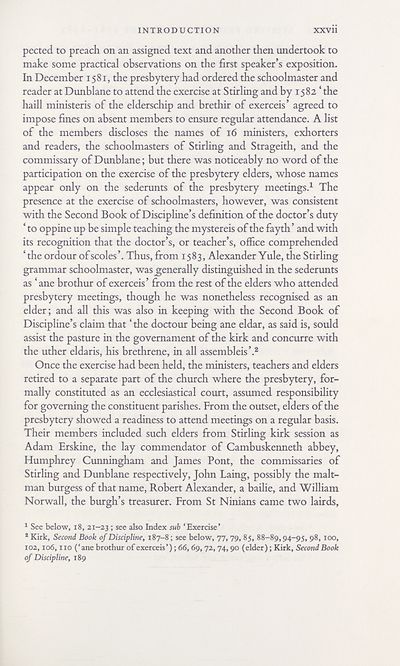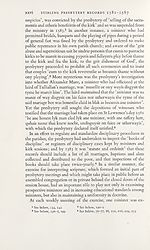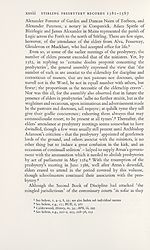Series 4 > Stirling Presbytery Records 1581-1587
(32) Page xxvii
Download files
Complete book:
Individual page:
Thumbnail gallery: Grid view | List view

INTRODUCTION
XXV11
pected to preach on an assigned text and another then undertook to
make some practical observations on the first speaker’s exposition.
In December 1581, the presbytery had ordered the schoolmaster and
reader at Dunblane to attend the exercise at Stirling and by 1582 ‘ the
haill ministeris of the elderschip and brethir of exerceis’ agreed to
impose fines on absent members to ensure regular attendance. A list
of the members discloses the names of 16 ministers, exhorters
and readers, the schoolmasters of Stirling and Strageith, and the
commissary of Dunblane; but there was noticeably no word of the
participation on the exercise of the presbytery elders, whose names
appear only on the sederunts of the presbytery meetings.1 The
presence at the exercise of schoolmasters, however, was consistent
with the Second Book of Discipline’s definition of the doctor’s duty
‘ to oppine up be simple teaching the mystereis of the fayth’ and with
its recognition that the doctor’s, or teacher’s, office comprehended
‘the ordour ofscoles’. Thus, from 1583, Alexander Yule, the Stirling
grammar schoolmaster, was generally distinguished in the sederunts
as ‘ane brothur of exerceis’ from the rest of the elders who attended
presbytery meetings, though he was nonetheless recognised as an
elder; and all this was also in keeping with the Second Book of
Discipline’s claim that ‘the doctour being ane eldar, as said is, sould
assist the pasture in the govemament of the kirk and concurre with
the uther eldaris, his brethrene, in all assembleis’.2
Once the exercise had been held, the ministers, teachers and elders
retired to a separate part of the church where the presbytery, for¬
mally constituted as an ecclesiastical court, assumed responsibility
for governing the constituent parishes. From the outset, elders of the
presbytery showed a readiness to attend meetings on a regular basis.
Their members included such elders from Stirling kirk session as
Adam Erskine, the lay commendator of Cambuskenneth abbey,
Humphrey Cunningham and James Pont, the commissaries of
Stirling and Dunblane respectively, John Laing, possibly the malt-
man burgess of that name, Robert Alexander, a bailie, and William
Norwall, the burgh’s treasurer. From St Ninians came two lairds,
1 See below, 18, 21-231 see also Index sub ‘Exercise’
1 Kirk, Second Book of Discipline, 187-8; see below, 77, 79, 85, 88-89,94-95, 98, 100,
102,106, no (‘anebrothur of exerceis’); 66,69,72, 74,90 (elder); Kirk, Second Book
of Discipline, 189
XXV11
pected to preach on an assigned text and another then undertook to
make some practical observations on the first speaker’s exposition.
In December 1581, the presbytery had ordered the schoolmaster and
reader at Dunblane to attend the exercise at Stirling and by 1582 ‘ the
haill ministeris of the elderschip and brethir of exerceis’ agreed to
impose fines on absent members to ensure regular attendance. A list
of the members discloses the names of 16 ministers, exhorters
and readers, the schoolmasters of Stirling and Strageith, and the
commissary of Dunblane; but there was noticeably no word of the
participation on the exercise of the presbytery elders, whose names
appear only on the sederunts of the presbytery meetings.1 The
presence at the exercise of schoolmasters, however, was consistent
with the Second Book of Discipline’s definition of the doctor’s duty
‘ to oppine up be simple teaching the mystereis of the fayth’ and with
its recognition that the doctor’s, or teacher’s, office comprehended
‘the ordour ofscoles’. Thus, from 1583, Alexander Yule, the Stirling
grammar schoolmaster, was generally distinguished in the sederunts
as ‘ane brothur of exerceis’ from the rest of the elders who attended
presbytery meetings, though he was nonetheless recognised as an
elder; and all this was also in keeping with the Second Book of
Discipline’s claim that ‘the doctour being ane eldar, as said is, sould
assist the pasture in the govemament of the kirk and concurre with
the uther eldaris, his brethrene, in all assembleis’.2
Once the exercise had been held, the ministers, teachers and elders
retired to a separate part of the church where the presbytery, for¬
mally constituted as an ecclesiastical court, assumed responsibility
for governing the constituent parishes. From the outset, elders of the
presbytery showed a readiness to attend meetings on a regular basis.
Their members included such elders from Stirling kirk session as
Adam Erskine, the lay commendator of Cambuskenneth abbey,
Humphrey Cunningham and James Pont, the commissaries of
Stirling and Dunblane respectively, John Laing, possibly the malt-
man burgess of that name, Robert Alexander, a bailie, and William
Norwall, the burgh’s treasurer. From St Ninians came two lairds,
1 See below, 18, 21-231 see also Index sub ‘Exercise’
1 Kirk, Second Book of Discipline, 187-8; see below, 77, 79, 85, 88-89,94-95, 98, 100,
102,106, no (‘anebrothur of exerceis’); 66,69,72, 74,90 (elder); Kirk, Second Book
of Discipline, 189
Set display mode to:
![]() Universal Viewer |
Universal Viewer | ![]() Mirador |
Large image | Transcription
Mirador |
Large image | Transcription
Images and transcriptions on this page, including medium image downloads, may be used under the Creative Commons Attribution 4.0 International Licence unless otherwise stated. ![]()
| Scottish History Society volumes > Series 4 > Stirling Presbytery Records 1581-1587 > (32) Page xxvii |
|---|
| Permanent URL | https://digital.nls.uk/126646539 |
|---|
| Description | Over 180 volumes, published by the Scottish History Society, containing original sources on Scotland's history and people. With a wide range of subjects, the books collectively cover all periods from the 12th to 20th centuries, and reflect changing trends in Scottish history. Sources are accompanied by scholarly interpretation, references and bibliographies. Volumes are usually published annually, and more digitised volumes will be added as they become available. |
|---|


